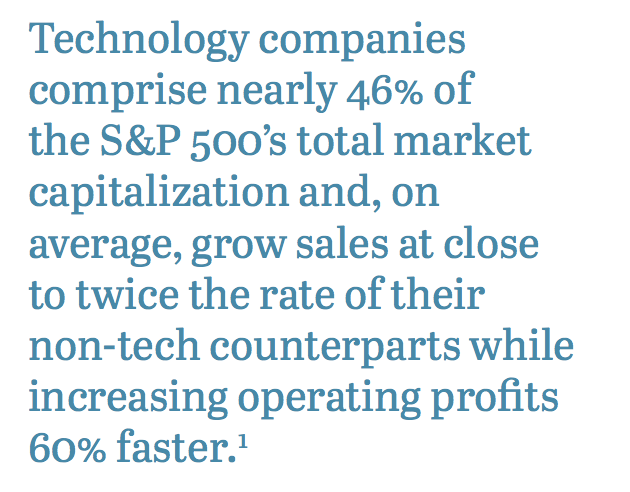
This quarter features Chris Moshy, Senior Vice President, Domestic Equities and Chief Investment Officer, Eric P. Leve, CFA, as they dive in to the multifaceted case to be made for technology as a staple in long-term portfolios.
March 31, 2021
Eric P. Leve, CFA: What a year for tech. As you and I chat today, we’re just one year (and a few days) past the market lows of March 23, 2020. In the one-year period since that day, the technology sector enjoyed nearly a 91% total return (as measured by the S&P North American Technology Sector Index) and, in recent weeks, also experienced increased volatility.
Chris Moshy: A wild ride, indeed. However, as long-term investors, we recognize that technology companies are at the heart of global economic growth and, in many ways, 2020 was a transformative year for the sector. We also understand that the past year’s run up in equity prices might give some investors pause, but let me make the case for tech’s central role in long-term investment portfolios. It’s really driven by two themes: the broad and accelerating impact of technology on consumers, businesses and society, as well as the fact that technology companies generate superior operating results.
Eric: Given that this conversation is taking place on a public tech company’s video service using cloud-based storage over high-speed internet, by all means, let’s hear it. Could you set the stage for me with a bit about the reach of technology today?
Chris: It’s undeniable. From retail and entertainment to oil and gas, finance, manufacturing, or any number of other industries, technology is likely playing a key role in managing and growing that business. Video and social media sites are hosted by behemoth cloud-based storage and computing platforms. Just because you might not be addicted to a smart watch on your wrist doesn’t mean that a mind-boggling amount of software, hardware, and artificial intelligence algorithms aren’t touching your daily life.
Eric: And that’s why we’ve seen investors dive in, fueling tech’s outperformance and higher valuations.
Chris: That’s certainly the first pillar I mentioned. Today, technology products and services are the primary growth drivers for most industries throughout the world’s economies. But there’s more to it than just the pervasiveness of tech in our lives.
Fundamentally, technology companies, in the long run, generate superior operating results compared to other industries. Tech companies grow sales at close to twice the rate of their non-tech counterparts and, on average, increase operating profits 60% faster.(1) Moreover, the faster growth in the tech sector is accompanied by higher profit margins, lower balance sheet leverage, and superior returns on invested capital.
Eric: What really strikes me is technology’s influence across almost all sectors. I’m thinking of how Apple several years ago became the world’s largest watch maker, and the Apple Watch actually outsold the entire Swiss watch industry starting in 2019.(2)
Shifting now to tech’s versatility, could you elaborate on the opportunities to trade within the sector?
Chris: Absolutely, Eric. Tech isn’t a one-dimensional investment. It’s so pervasive that you can exploit a cyclical economic shift within the sector itself.
Take this example. An investor that has determined the economy is shifting toward economic recovery would generally favor more cyclical industries and would perhaps trade out of tech and into manufacturing. Our approach is similar in concept but stays within the tech sector. Meaning, you could sell the high-growth analytics software company and then look to invest in tech companies in the manufacturing supply chain, like semiconductors.

Staying within the tech sector, we see companies exposed to a broader set of end market and industries that experience varying levels of cyclical and secular business activity. In this example, that semiconductor company may be benefitting from a cyclical lift in demand from truck and auto manufacturing while also responding to demand changes from 5G mobile handsets, cloud data center buying patterns, and gaming console product cycles. We feel what is becoming increasingly clear is that technology companies now represent the deepest, most diversified set of opportunities within both cyclical and secular growth industries.
Eric: But what about the volatility? Even looking beyond the last few weeks where tech has started to slow its meteoric rise, technology companies have long traded at a premium to the broader market. For exactly the reasons you mentioned earlier, investors apply higher valuations.
Chris: Indeed they do, and technology sector returns also have higher volatility than non-tech counterparts. Yet, investors should take a moment to normalize those outsized valuation multiples for the differences in growth rates. The intrinsic value of the faster growth, higher profits, and better returns on investment often justifies the higher valuations of technology equities. We also find the higher returns of technology-driven companies adequately compensate for the higher volatility of share prices.
And, I can guess what your next question will be, Eric. Yes, in fact, the tech sector has shown volatility year-to-date as it dipped in mid-February and ended the quarter up 3.4%, or about half the S&P 500 return for the same period (total return, as measured by the S&P North American Technology Sector Index). In the tech sector, we have seen a similar rotation to reopening and recovery plays with some industry sectors, such as semiconductors, returning 10% in the first quarter.
Conversely, tech investors experienced a sell-off in high growth stocks. Many of the quick-growing software companies aren’t yet generating profits and their cash flow time horizons are too long for investors’ appetites right now. Piling on, high growth stocks are typically out of favor in a rising interest rate environment like we find ourselves in today. But we hold to the fundamental thesis based on the dominance and superiority of tech companies and, historically, after interest rates stabilize, the tech sector has been a strong performer.
Eric: Thanks Chris. As machinery and devices become more complex and powerful, technology-driven companies will only become more central, which only strengthens the case for tech as a staple in investment portfolios. As always, I appreciate both your passion and the opportunity for a deep dive into the fundamentals!
1 S&P 500 Tech-plus Universe versus S&P 500 non-tech counterparts as of 12/31/2020. Analysis based on the securities held in the S&P 500 index. Sources, Standard & Poor’s Financial Services LLC:, Bloomberg, L.P., and Bailard, Inc.
2 https://www.cnbc.com/2020/02/06/apple-watch-outsold-the-entire-swiss-watch-industry-in-2019.html
Recent Insights
Bailard CEO Ft. in Forbes, “Three Ways To Put Your Values And Your Team First In A Competitive Market”
Bailard's CEO Sonya Mughal, CFA offered three insightful ways leaders in the industry can fortify their culture and step up their communication practices to attract and retain high-performing teams.
May 2, 2024
Country Indices Flash Report – April 2024
The Japanese yen hit its lowest level versus the dollar since the 1980s late in the month, followed by a sharp bounce in the currency, which most suspect was driven by official intervention.
April 30, 2024
Quarterly International Equity Strategy Q1 2024
The global economic environment changed dramatically in the first quarter as bond yields, which had marched down in the 4th quarter on the belief that central bank pivots were fast approaching, reversed course. Prospects for mid-year reductions in short-term interest rates remain high for Europe and the UK, but persistent strength in the U.S. labor market has pushed prospects for a shift there closer to the end of 2024. Still, non-U.S. equities found purchase in solid earnings even as they faced headwinds from a strong dollar due to the evolving central bank dynamics and heightened geopolitical risks. As noted below, we see a range of foreign stocks that can flourish in the current environment and remain excited for the potential of stocks both in developed and emerging markets to compete well against U.S. peers.
April 25, 2024
Keep Informed
Get the latest News & Insights from the Bailard team delivered to your inbox.